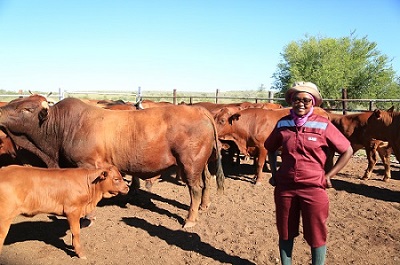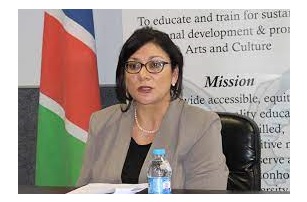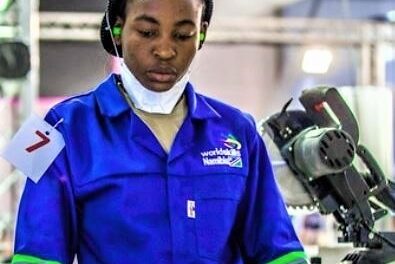
Agribank’s mentee and post-settlement loan beneficiary Elize Eliphas is a young female resettled commercial farmer in the area of Maltahohe district near Mariental in the Hardap region.
Eliphas’s farming journey started at the tender age of 14 with her parents at their homestead in the northern part of Namibia and through assisting her sister who was a small-scale farmer in the Kavango-East region.
After completing her Grade 12 with flying colours, she was advised to pursue medicine as a career, an idea she rejected and instead opted to enroll for an agricultural course at the Namibia University of Science and Technology.
“People look at agriculture as a field for the poor academic performers and when I decided to study agriculture, many people wanted me to do medicine which was not my preference. My passion is agriculture. All I knew in my life was agriculture and my first 2 years of study was paid with money from farming,” the 32 year-old narrated.
Eliphas remained unemployed for six years after graduating and it was during this time that she came across a newspaper advertisement for farm resettlements. She applied and was resettled in 2015. Towards the end of the same year, she also received a Post Settlement Loan from Agribank to buy livestock, improve and maintain her resettled production unit.
After two years of trial and error in farming, Eliphas approached the Bank again to request for mentorship services. In July 2017, she was onboarded on Agribank’s mentorship program and attached to Mr Johannes Motinga in the Hardap region.
“I really appreciate Agribank’s free mentorship programme. My mentor really opened my eyes to treat farming as a business. He taught me different aspects of farming at a commercial level, ranging from record-keeping, vaccinating programme, production plan, marketing, animal hygiene and farm diversification amongst others,” she explained.
One of the biggest challenges she faced as a farmer, was the 2019 drought. Another challenge was the outbreak of the Orf disease in her goats last year that resulted in more loses at her farm. Currently, Eliphas farms with livestock (cattle, goats and sheep), poultry as well as growing some crops.
She has 3 employees and three other agriculture students from NUST who are on a 6-month job attachment contract.
“In the next five years, I picture myself as successful commercial farmer from the resettled unit, and I want to be exemplary to other resettled farmers, who get resettled and become a burden to government by turning their farms into white elephants,” she shared her vision.
She urges fellow young people to utilize their time wisely, by spending most of their time on constructive ideas such as engaging in farming. She further advised young Namibians who harbour ideas of farming to start small and seek for support from role players in the sector such as Agribank.
“My message to my fellow youth is that let’s stop wasting our valuable time in unconstructive things such as drinking, complaining and gossiping. All these things will take us nowhere in life,” she enthused.
In the photo: Proud young farmer Elize Eliphas standing in front of some of her cattle.






